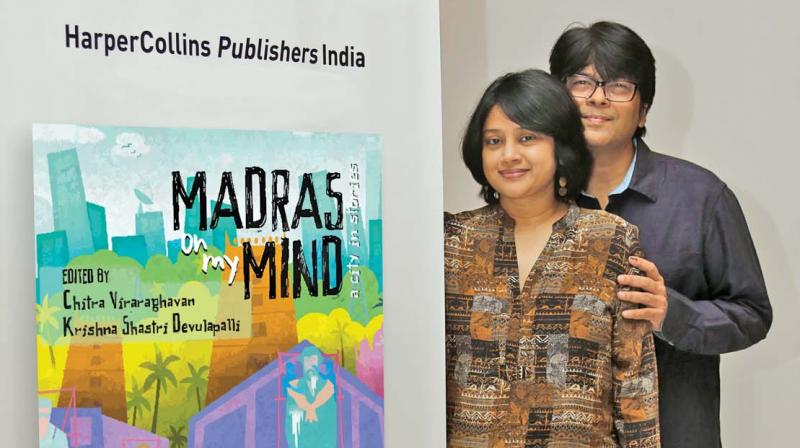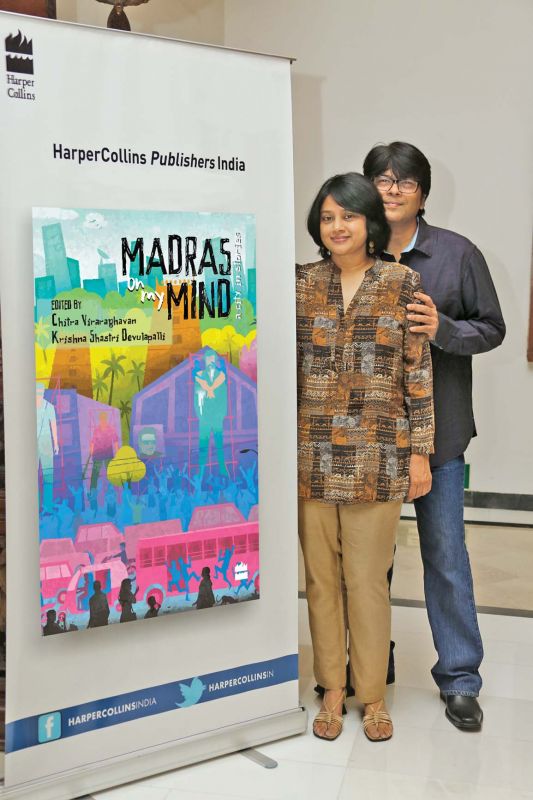Tales of the quintessential Madras!

My association with Madras began with a bang ...several, in fact, because it was the time of Deepavali. We came in by train and got off at Egmore station and crackers and bombs were going off everywhere! The sky was lit up and the noise levels were quite high. Our little dog Timmy and our cat Fluffy were very scared!” shares Harry MacLure, one of the writers of Madras On My Mind.
Everyone associated with the city has an interesting story to tell about Madras.
Editors Chitra Viraraghavan and Krishna Shastri wanted to put together such short stories about the city to celebrate its 378th year. “The book was Krishna’s idea and I came up with the title. The book has a mix of veterans and first-timers, as well as some pieces in translation from Tamil and Telugu,” reveals Chitra. Krishna adds, “What we were looking for were not the usual, stereotypical depictions of Madras, say, involving filter coffee, Carnatic music, mallippoo or the December Season! Instead, we wanted edgy takes on our city and that’s what the 20 stories we chose gave us!”
From train journeys to floods, from poverty and hunger to hostel days of young boys, from silver screens to complicated relationships, the book is an unconventional, yet relatable collection of stories to every Chennaiite.
Talking about their love for the city, the editor duo shares, “Although Chennai is a dynamic city, we have retained the old-fashioned civility and grace — which includes the welcoming of newcomers, while allowing necessary elements of modernity to come in. I would describe it as a safe and inclusive city, which is a massive plus, considering the time we live in. Madras is also a city that supports and encourages women.” Adding to which, Harry says, “Madras has surely shaped me into who I am today — it has given me a home, it has given me confidence, a job, and above all, it has given me respect as a person.”
Recollecting the teen days spent in the city, Harry, who has penned the story, A Passing Show, reveals, “It tells the story of a young Anglo-Indian boy (that is me) who begins life in awe of the big, sprawling city. It also describes the life and times of the Anglo-Indians like us, who used to live in localities like Perambur, Vepery, Purasawakam and the Railway Colony in Ayanavaram. My favourite spot in the city is the Loco Works Bridge. Being a railwayman’s son, I get a lot of pleasure crossing this bridge. For me, it’s like a time machine that takes me back to a world that I miss!”
Raising a toast to the city’s resilient spirit after every natural or man-made disaster, Chitra says, “What I have noticed is, although we are mostly quiet and reserved people, how we come together during times of crisis — the great Madras flood of 2015 is an example, as also the large but peaceful protests on the Marina before the politicians gate-crashed.” Harry states, “More than the city, it’s the resilience of the people that I admire the most. Be it the tsunami or the floods or Vardah or even the problem with jallikattu, people from all cultural backgrounds bounced back to being normal in no time!”
He concludes by saying, “I also look forward to writing a novel soon, which is set in Madras right after India gained its independence — when most Anglo-Indians were immigrating to Western shores.”


